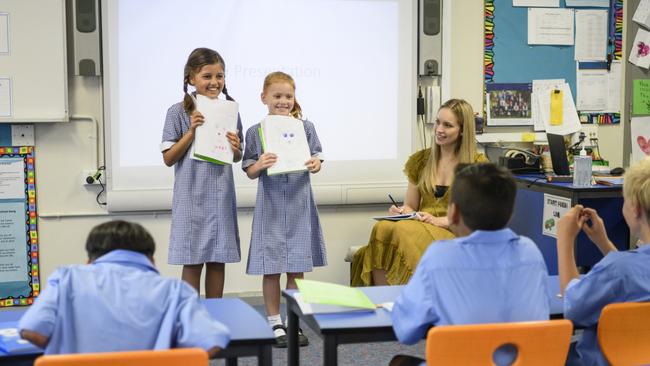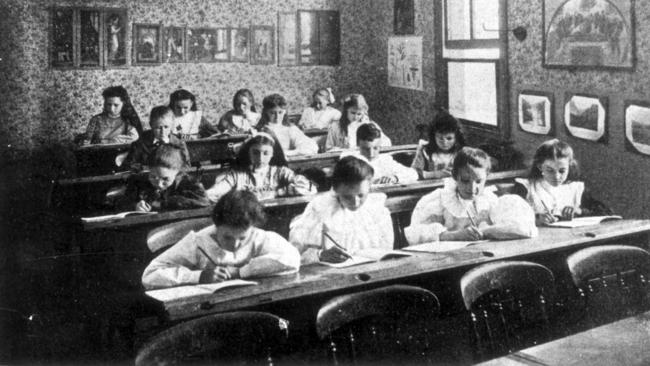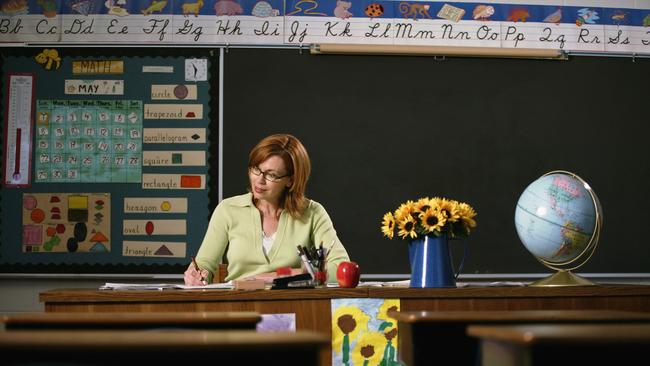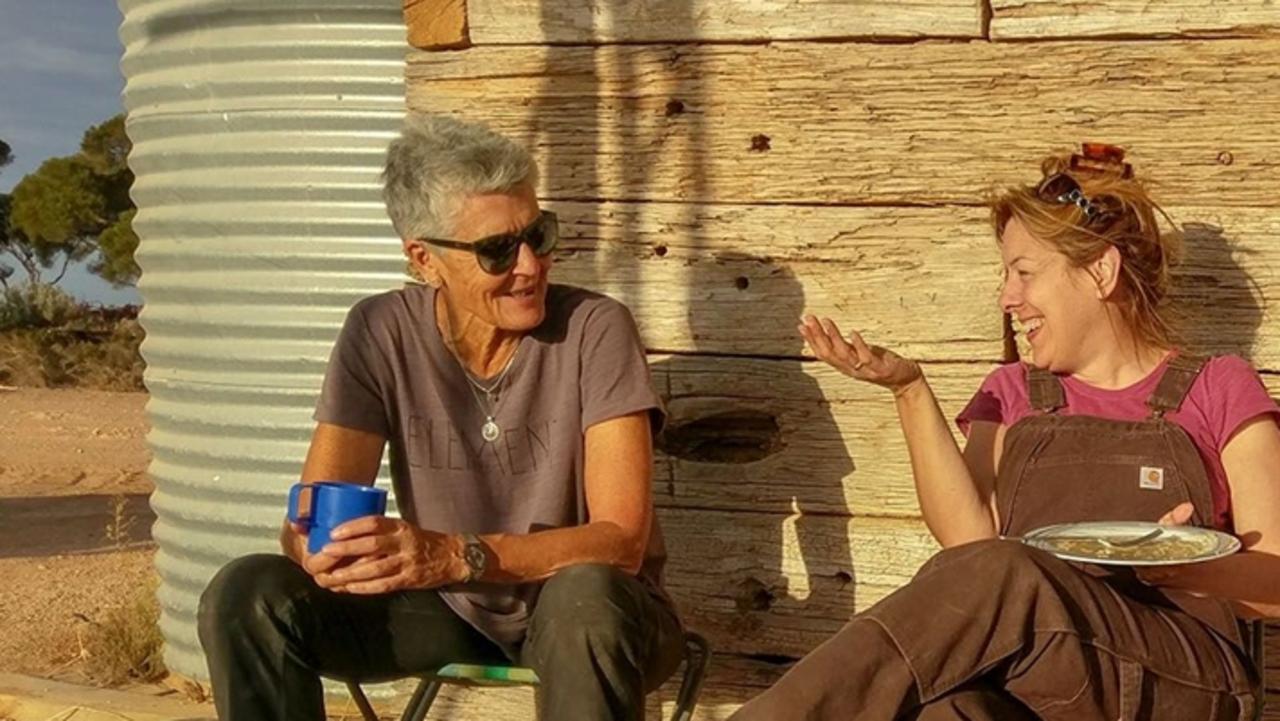We entrust our kids to the care of teachers yet take little care of them
Many parents make the extreme self-sacrifice of paying up to $40,000 a year to send their children to private schools. But they too often fail to take the next, most important, step.

Philosopher Hannah Arendt wrote in 1961: “Education is the point at which we decide whether we love the world enough to assume responsibility for it and by the same token save it from the ruin which, except for renewal, except for the coming of the new and young, would be inevitable.
“And education too is where we decide whether we love our children enough not to expel them from our world and leave them to their own devices, nor to strike from their hands their chance of undertaking something new, something unforeseen by us, but to prepare them in advance for the task of renewing a common world.”
Parents understand this. Many are willing to make extreme self-sacrifice and pay up to $40,000 a year to send their children to private schools, not trusting the free government system.
They may inhibit their lifestyle, burden themselves with financial worries, even mortgage their futures. Hardly anyone would pay those sorts of fees if they weren’t deeply troubled about their children’s development, instinctively knowing that quality of education might be the key. Often they do not take the next step, to realise that the quality of education is utterly dependent on the quality of individual teachers.
Alarm bells should be ringing in Australia today. As they are to some unfocused degree in newspaper headlines expressing disquiet over the deteriorating mental health of teenagers, soaring rates of school truancy and fear about declining aggregate NAPLAN scores in basic numeracy and literacy. The problem is broad and deep. It has resulted, at the core, from the declining authority of the teacher in the classroom. In turn, this reflects gradual changes in the wider culture since Arendt was writing.
Formality used to be more institutionalised. When teachers were always addressed as Mr Smith or Sir, or Mrs Jones or Miss, they stood more at a distance, the classroom atmosphere cooler, the teacher as instructor rather than friend or equal. The principal was a remote figure who could be referred to as an authority of last resort, with the threat of stern rebuke or punishment.
The physical punishment of strapping or caning has become unthinkably barbaric today. There was a time when it was the ultimate coercive tool in maintaining discipline. While no one would argue for its return, it must be acknowledged that it made it generally easier, even in the much larger classrooms of the 1960s, to instil obedience and respect.
There is progress and regress at work here, making any overriding judgment difficult. Friendlier, warmer relations in the best classrooms today are to the good. Just as the closer relations within families between parents and their children, breaking down old generation gaps of misunderstanding, are to the good.
But such progress has come at the price of making it more difficult to control places such as large classrooms of unruly students, where order depends on the teacher’s ability to keep control, backed by a wider school culture of formality and discipline.

To put this in context, the central question about the rise of modern society is what transformed the typical person of the European Middle Ages – violent, immoderate, perceiving the world in childlike extremes – into the self-controlled, disciplined and inward individual who has come to occupy a central position in societies such as our own. Schooling played a central role in this long historical process. Generation after generation followed the simple and punitive adage of spare the rod and spoil the child.
Further, it was the capacity for systematic and sustained work and for rational, calculated organisation that was to constitute the human prerequisite for the development of the industrial democratic society that was to emerge. Medieval forebears were, by disposition, incompatible with the workings of modern society, being far too emotionally unstable to work regular hours in a modern office, factory or shop.
And schooling today retains a good deal of its civilising function, the slow and laborious work of instilling in children the capacity for self-control and concentration. The common put-down that the main job of schools is childminding, while holding some truth, vastly underestimates the role in the character development of the young.
Then came the 1960s, and a new injection of the Rousseau fallacy that humans in the state of nature were happy and free before being ruined by the artifices of civilisation. They were “noble savages”. This fed through into an educational philosophy centred on belief in the innate creativity of the child, with the task of schooling just to stand back to encourage self-realisation. Rote learning of the times tables was out; playful fun was in. Australian director Peter Weir drew on his Sydney school experience, in his brilliant 1989 film Dead Poets Society, to explore this territory, showing how an inspired poetry teacher could be just as destructive to teenage mental equilibrium as the old order he replaced, one of stiflingly routine discipline. At risk, as Rousseau might have celebrated, was the reversing of centuries of the civilising process.
It’s worth recalling that even in Elizabethan London the typical church or theatre audience would have been unrecognisable to us – a constant chattering hubbub of restless shuffling, squabbling, nudging, spitting and swearing. But is it much better today in an average Australian high school, with inexperienced female teachers in their 20s trying to control restless 16-year-old boys, unsettled by bubbling levels of testosterone, boys who don’t want to be there?
It has become extremely difficult to be a secondary school teacher. Those who are privileged to work in the private school system, or in a few elite government schools, provide the exception. In both those atypical categories, behaviour management in the classroom tends not to be a morale-crushing problem.
Behaviour management, requiring teachers to be prison officers, but without the bars or the solitary confinement, is not a stand-alone challenge.
Teachers in a recent ongoing South Australian study spoke of an alarming increase in misogynistic, homophobic, racist and sexist language and behaviours, mostly by boys and young men targeting girls and young female teachers.
This includes intimidating physical confrontation of female teachers as well as shameless sexual innuendo, teachers who were on their own in classroom, corridor or carpark without any other adult support, and sometimes with no serious backing from a principal, plus hostility from parents who couldn’t credit that their darling son could be such an insensitive brute. Such parents, in their turn, reflect the decline of the authority of the teacher and a general disrespect for their position.
If discipline is one side of the education coin, engagement is the other. Changes to the curriculum, such as introducing phonics in teaching primary school children to read, will mean little without capable, talented teachers to arouse the interest of their students, stimulate them, making them want to learn. A bored classroom is a dead classroom.
If income is a lead indicator of social status, then tradies rank far higher in today’s Australia than teachers. Plumbers and electricians may be indispensable in day-to-day life, but are they more important to the long-term wellbeing of the society?
Plato, in his last work, signalled his judgment after a long life of reflection: the most important institution in any society is the one that teaches the teachers. By implication, he regarded teaching as the highest of all vocations. Australia today seems to invert Plato, with teacher training degrees of low status, generally of mediocre intellectual calibre, and including little practical hands-on training in classrooms. To be fair, federal Education Minister Jason Clare and his state counterparts are trying to reform teacher training, to focus it more on practical experience and the capacity to teach basic literacy and numeracy. Their success, if gained, would be of greater long-term benefit to the country than almost anything else their governments achieve.

The ability to engage students is the first principle of teaching. It requires some charisma in the classroom. Gifted teachers will almost inevitably communicate an enthusiasm for their subjects. This is no more than a by-product of the true mission of education, at its highest. Teachers are servants of the truth, dedicated to passing it on. Their role illustrates the centrality to the good life of coming into harmony with the deep truths of human existence; and believing in the possibility of so doing.
This even holds in scientific and vocational disciplines, where an ethos is transmitted, including timeless methods of thinking, and ways to attack problems, as well as factual knowledge.
Life, under this star, becomes a long voyage of learning, with the teacher as captain, bestowing legitimacy and authority on the voyage. A minority of teachers may be in this gifted category, influencing their students irrespective of the wider environment within which they work.
Yet the wider environment can make a crucial difference. When morale is high in a school, with a camaraderie among the teachers encouraging belief in the fine mission of what they do, then many will perform much better than their lesser selves would otherwise allow. In a good school, the average teacher can become a great teacher. Further, high conviction and enthusiasm among teachers are infectious and will usually transmit to students.
Education is broader than schooling. The most effective learning is often indirect, working unconsciously, with slow impact on the motivational complexes churning deep within an individual. Parents play the critical role here, as unwitting exemplars more than guides – and obviously, for bad as for good. There are also key educational influences on the bigger social stage. Take the recent Olympics. It displayed young men and women, many hardly more than boys and girls, who have dedicated years of their lives to their sport and then produce world record-breaking performances on the global stage, winning the adulation of their nation as they ascend the dais, the gold medal placed around their neck, and shedding tears of joy as the flag rises to the playing of the national anthem.
These athletes must inspire in many watching children the aspiration to be like them. At the least, they project the value of a lifestyle of Spartan discipline, of years of relentless training, much of it routine and dull, the denial of most other life pleasures, all focused on achieving their dream goal. Here is the work ethic championed in neon lights.
All elite sport supplies individual role models in the heartland of popular culture. It also underlines the accompanying recognition, in a housing society of often vague wishy-washy standards, that there are incontrovertible benchmarks, objective differences between the top team on the ladder and the bottom one, as there are differences between star players and average ones. Further, great athletic performance depends on coaching, with the quality of that coaching vital. In sport, the coaches are the teachers and respected as such.
Indigenous Australians, when their tribal culture was still intact, understood the deep significance of education. Their central and most important social ritual was the initiation of boys on reaching puberty. The Mardu ceremonies in the Western Desert were typical.
Across six months or thereabouts the male elders used tough love, in Arendt’s terms, to subject the boys to systematic physical torture, which might include nose-piercing, tooth removal and the extraordinarily painful subincision in which the penis is cut through to the urethral canal with a stone tool.
The boy was treated as a nobody, without name, not to be spoken to. Covered in ashes, it was as if he were dead. Separated from his mother, his child self was being symbolically killed off. Then he was secretly introduced to the religious secrets of the tribe – its sacred objects, its rites, its songs and stories, and their significance. He was being born again into the culture. The initiation ritual, steeped in deliberate trauma, was replete with symbolism of death and rebirth. Its success was marked in the central lifelong dedication the adult would later show to the religious rites and lore of his tribe.
One generalisable lesson suggested here is that the gaining of full maturity depends on initiation, a successful rite of passage from child to adult. Otherwise, the individual will never truly grow up. In modern Western societies, initiation is opaque, protracted and diffuse, with a central role played by schooling – another reason for its deep seriousness.
Shakespeare explored the initiation theme in his portrait of the ideal king, Henry V. Henry had a wild and dissolute youth spent in taverns among low-life scoundrels, one that led his dying father to despair of what would happen to England under his son’s imminent rule. The moment Henry becomes king, however, he metamorphoses into a wise, balanced and courageous ruler. One message is that education may not require formal schooling.
Shakespeare, in one of his next plays, contrasts the immaturity of the 30-year-old Hamlet, whose melancholy disposition is due, in part, to him never having managed to leave his child self behind.
If we love our children, then surely, we must love the world into which we have brought them. We entrust our children, for most of the time of their maturing, to the care of teachers. Yet we take little responsibility for the care of those teachers but just seem to close our eyes and hope for the best. One of the many failings of contemporary universities was not to take teacher training seriously when they were given responsibility for it, but rather to relegate it to the margins as a lowbrow addition to the academy.
In this, universities were just reflecting the poor regard in which schoolteachers were held in the wider society. Until this foolish attitude changes, true educational reform is unlikely.
John Carroll is professor emeritus of sociology at La Trobe University.



To join the conversation, please log in. Don't have an account? Register
Join the conversation, you are commenting as Logout